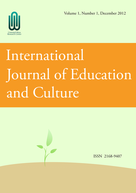


Volume 13 Issues 3-4 (2024-12-31)
Volume 13 Issues 1-2 (2024-06-30)
Volume 12 Issues 3-4 (2023-12-31)
Volume 12 Issues 1-2 (2023-06-30)
Volume 10 Issues 1&2 (2021-06-30)
Volume 9 Issues 3&4 (2020-12-31)
Volume 9 Issues 1&2 (2020-06-30)
Volume 8 Issues 3&4 (2019-12-31)
Volume 8 Issues 1&2 (2019-06-30)
Volume 7 Issues 3&4 (2018-12-31)
Volume 7 Issues 1&2 (2018-06-30)
Volume 6 Issues 3&4 (2017-12-31)
Volume 6 Issues 1&2 (2017-06-30)
Volume 5 Issues 3&4 (2016-12-31)
Volume 5 Issues 1&2 (2016-06-30)
Volume 4 Issues 3&4 (2015-12-31)
Across the globe, from the very wealthy continents of North America to Europe to Australia, the phenomenon of migrant and immigrant students outperforming native students are observed and documented. Even within the same race, achievement differences are being observed. What might account for the achievement success of one group of students over the other group? Are achievement differences among the migrant and non-migrant groups linked to only family dynamics or to socio-cultural or to psychological factors? Ogbu’s (1998) Cultural-Ecological Model appears to be insufficient in completely and effectively accounting for these achievement differences. Therefore, the author is proposing a more comprehensive, “Interdisciplinary Theoretical Model of Migrant Schooling” to effectively account for the achievement differences seen across the globe.
This paper investigated the effectiveness of Outcome-Based Education (OBE) training workshops on Afghan EFL Instructors’ knowledge, skills and attitudes toward implementing OBE in their classrooms. Mixed research methods were employed for the data collection and analysis. The study was conducted in five different universities of Afghanistan and data collected from nine available English language instructors who participated in OBE training workshops during 2016- 2018 and piloted OBE in their classrooms. A self-developed questionnaire and semi-structured interview were used for data collection. Data were analyzed through descriptive statistics (i.e., means, correlations and t-tests) and thematic analysis. Major findings indicated that most of the Afghan EFL instructors were highly satisfied from the OBE training—its materials and contents and their knowledge about OBE were significantly improved. The findings also revealed that to some extent OBE training workshops were effective in terms of enabling participants to shift form teacher-centered methods to OBE and student-centered approaches. However, in terms of applying OBE in ELT, participants reported certain barriers and challenges. This entails that more workshops, resources and facilities are required.